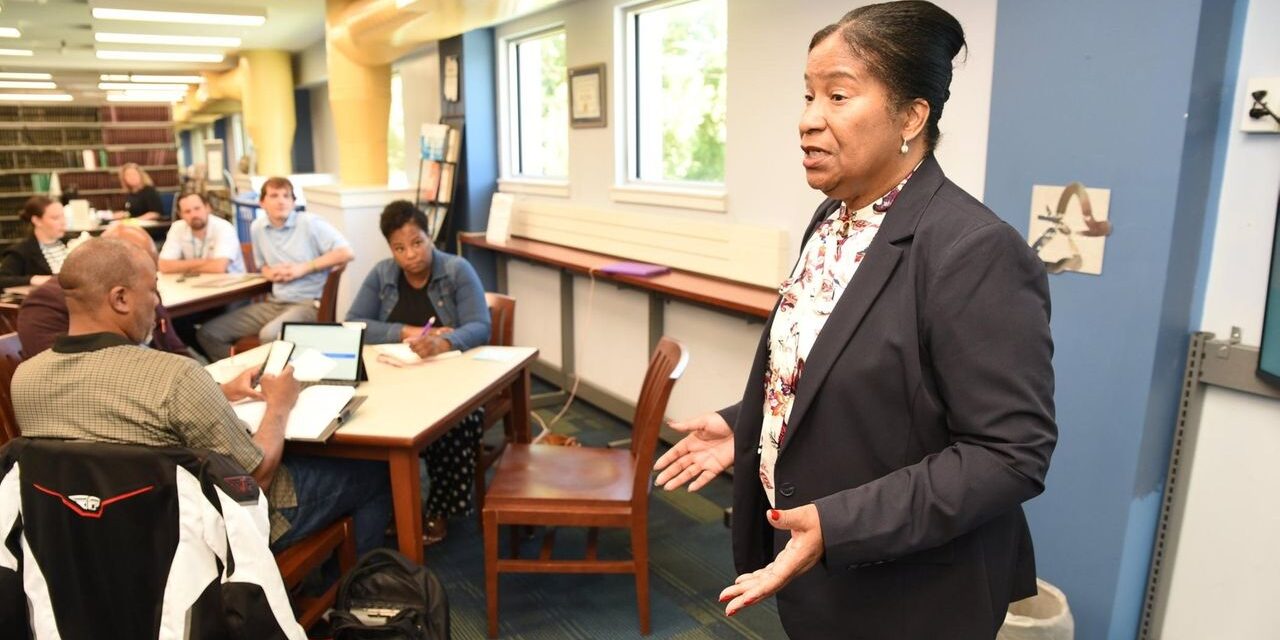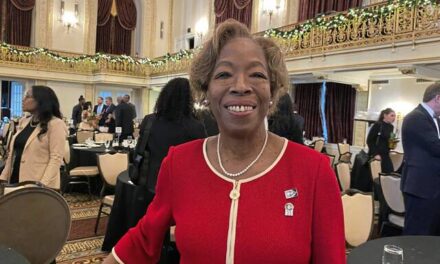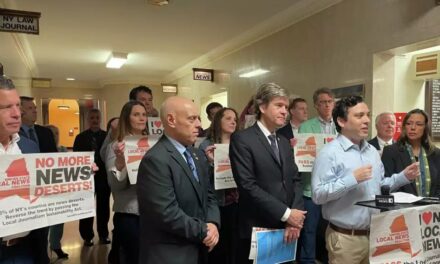A secret-shopper study of small business lending that included Nassau County banks found “significant disparities” in the way white and Black borrowers were treated while seeking loans.
The Consumer Financial Protection Bureau said Black borrowers in its study were less likely to receive encouragement from lenders to apply for a loan. Those lenders were more likely to present alternative credit options, such as credit cards and home equity loans, to Black borrowers than their white peers.
Borrowers using credit cards face higher rates of interest. Home equity loans, as opposed to business lines of credit, can put a business owner’s home at risk if they default, the CFPB noted.
“The results of our secret shopping are consistent with the longstanding concerns that small business loan borrowers experience different treatment based on their race,” Rohit Chopra, director of the CFPB, said in a statement.
Rose Ward, founder of small business consulting firm NFocus Management Group in Uniondale, said she wasn’t surprised to see the results of the study, which was released last week. She said she previously had a negative experience trying to open a business banking account in Nassau County.
“Depending on who you are, whether it’s Black, Hispanic, they are always going to steer you to something else other than what you want,” said Ward, who is vice president of the Long Island African American Chamber of Commerce. “Interest rates will always be higher, and they’re going to come back and say you don’t qualify.”
In one example cited in the study, a Black borrower was told his business was too small to qualify for a bank’s small business loan, but a white borrower, who presented a business of the same size, was encouraged to apply for a small business line of credit.
In another case, a lender told a white tester he qualified and encouraged him to apply, while the Black tester with a similar profile, who met with the same bank employee, was told he did not qualify and should go to a Small Business Administration loan office, according to the study.
The study found both white and Black borrowers were able to discuss the loan products they requested and said they felt encouraged to apply, on average, according to survey responses. But the study results showed differences that were statistically significant, according to the CFPB.
Lenders expressed interest in 40% of the white testers’ loan applications and 23% of the Black testers’ applications. Lenders suggested non-requested alternative credit products with 59% of Black testers and 39% of white testers, according to the CFPB.
The study “illustrates why collecting comprehensive lending data is crucial for uncovering discrimination,” the agency said. In July, the CFPB plans to start collecting more detailed information from large lenders, including the demographics of business owners who apply for loans and their approval status.
Clare Cusack, president and CEO of the New York Bankers Association, which represents community, regional and large banks statewide, said her organization had not yet fully reviewed the CFPB study earlier this week.
She stressed that the banking industry is committed to a discrimination-free lending environment.
“In all communities, banks are actively seeking borrowers,” Cusack said. “Banks are in business to make loans and they want to make credit available to all qualified borrowers on fair and reasonable terms.”
But for Phil Andrews, president of the Long Island African American Chamber of Commerce, the study shows the subtle ways business owners are discouraged from applying without consideration to their qualifications.
“Lending should be colorblind,” he said. “As long as the business fits the criteria that they need to ensure they’re going to repay the loan, there should not be barriers.”
The study involved 100 in-person visits to 50 bank branches — 25 in Nassau County and 25 in Fairfax County, Virginia — during several months last year. It used matched-pair testing, with individuals recruited to pose as borrowers.
The pairs, one Black tester and one white tester, were of the same sex and assigned high credit scores within a few points of each other. They assumed the profile of a small-business owner who had run their business for a similar amount of time in a comparable industry, according to the study.
The testers visited the bank branches and asked bank employees how they could expand their business through business loans and lines of credit. The testers audio recorded those interactions and completed post-visit surveys to describe their experiences.
The approach was similar to how Newsday investigated disparate treatment in Long Island’s real estate industry in its 2019 Long Island Divided series, which found widespread evidence of separate and unequal treatment of minority homebuyers.
The Fair Housing Justice Center, a Long Island City-based civil rights organization, administered the testing for Newsday’s investigation as well as the Nassau portion of the CFPB study.
Researchers said the study was too small to generalize the findings to the U.S. small business lending market or specific financial institutions, but does show evidence Black small-business owners were treated less favorably than their white peers at large banks in Nassau and Fairfax counties.
The study was not at a scope “to provide or evaluate specific guidance for financial institutions. Nevertheless, financial institutions may take steps to improve compliance management in light of our findings,” a CFPB spokesperson told Newsday.
The agency did not name the banks tested as part of the study. It said the lenders all had at least $10 billion in assets.
Small-business owners on Long Island have said they would like better access to financing. About two-thirds of respondents said growing their business was their top challenge and about 48% said access to capital was a challenge in a survey of 176 minority business owners released in March and published by Long Island University’s Steven S. Hornstein Center for Policy, Polling, and Analysis.
It can be difficult for Black business owners to get loans from traditional banks at affordable interest rates, said Melissa Briscoe, 36, who opened florist and gift shop Olive It Boutique in Merrick in 2022.
Briscoe said she decided to take out a loan at a 10% interest rate from Shopify, the platform she uses for online sales, which offered her financing, in part, because it has data on her daily revenue. She said expanding into selling Swedish candy was key to helping her stay afloat through the summer.
“I’m in Merrick, and I’m obviously a woman of color, and there’s not a lot of women of color businesses in Merrick, but I definitely feel like there should be more opportunities,” she said. “It should be easier for me to walk next door to Chase and be like, ‘Hey, I need to get a loan for XYZ amount. How can we make this happen?’ ”
Kenneth Ware, 36, has been the co-owner of Backyard Barbeque on Freeport’s Nautical Mile for the past four years after taking over the business from his father. Ware, a chef who’s also president of the Black Restaurant Coalition, a Brooklyn-based trade group, said small businesses need access to financing to survive through slower periods.
He would like to see lenders provide more support to minority restaurant owners.
“We’re looking for more ways to leverage and build those relationships,” Ware said. “Because, just in all business, that’s the No. 1 thing is having access to capital.”
Andrews, the African American chamber president, said his organization has partnered with local banks to hold monthly seminars that it hopes foster new relationships.
“Barriers are made to be broken,” he said.
A secret-shopper study of small business lending that included Nassau County banks found “significant disparities” in the way white and Black borrowers were treated while seeking loans.
The Consumer Financial Protection Bureau said Black borrowers in its study were less likely to receive encouragement from lenders to apply for a loan. Those lenders were more likely to present alternative credit options, such as credit cards and home equity loans, to Black borrowers than their white peers.
Borrowers using credit cards face higher rates of interest. Home equity loans, as opposed to business lines of credit, can put a business owner’s home at risk if they default, the CFPB noted.
“The results of our secret shopping are consistent with the longstanding concerns that small business loan borrowers experience different treatment based on their race,” Rohit Chopra, director of the CFPB, said in a statement.
- A federal study found significant differences in the way white and Black secret shoppers, posing as business owners, were treated at banks when they sought small business loans.
- The study included testing at 50 bank branches — 25 in Nassau County and 25 in Fairfax County, Virginia — during several months last year. The federal agency didn’t name the banks.
- Local business owners and leaders on Long Island said the findings highlight the barriers Black entrepreneurs face as they seek out financing to grow.
Rose Ward, founder of small business consulting firm NFocus Management Group in Uniondale, said she wasn’t surprised to see the results of the study, which was released last week. She said she previously had a negative experience trying to open a business banking account in Nassau County.
“Depending on who you are, whether it’s Black, Hispanic, they are always going to steer you to something else other than what you want,” said Ward, who is vice president of the Long Island African American Chamber of Commerce. “Interest rates will always be higher, and they’re going to come back and say you don’t qualify.”

Business consultant Rose Ward, pictured speaking at a Long Island African American Chamber of Commerce meeting in June, said the study results highlight challenges Black business owners face with local banks. Credit: Elizabeth Sagarin
In one example cited in the study, a Black borrower was told his business was too small to qualify for a bank’s small business loan, but a white borrower, who presented a business of the same size, was encouraged to apply for a small business line of credit.
In another case, a lender told a white tester he qualified and encouraged him to apply, while the Black tester with a similar profile, who met with the same bank employee, was told he did not qualify and should go to a Small Business Administration loan office, according to the study.
The study found both white and Black borrowers were able to discuss the loan products they requested and said they felt encouraged to apply, on average, according to survey responses. But the study results showed differences that were statistically significant, according to the CFPB.
Lenders expressed interest in 40% of the white testers’ loan applications and 23% of the Black testers’ applications. Lenders suggested non-requested alternative credit products with 59% of Black testers and 39% of white testers, according to the CFPB.
The study “illustrates why collecting comprehensive lending data is crucial for uncovering discrimination,” the agency said. In July, the CFPB plans to start collecting more detailed information from large lenders, including the demographics of business owners who apply for loans and their approval status.
Clare Cusack, president and CEO of the New York Bankers Association, which represents community, regional and large banks statewide, said her organization had not yet fully reviewed the CFPB study earlier this week.
She stressed that the banking industry is committed to a discrimination-free lending environment.
“In all communities, banks are actively seeking borrowers,” Cusack said. “Banks are in business to make loans and they want to make credit available to all qualified borrowers on fair and reasonable terms.”
But for Phil Andrews, president of the Long Island African American Chamber of Commerce, the study shows the subtle ways business owners are discouraged from applying without consideration to their qualifications.
“Lending should be colorblind,” he said. “As long as the business fits the criteria that they need to ensure they’re going to repay the loan, there should not be barriers.”
Testing banks
The study involved 100 in-person visits to 50 bank branches — 25 in Nassau County and 25 in Fairfax County, Virginia — during several months last year. It used matched-pair testing, with individuals recruited to pose as borrowers.
The pairs, one Black tester and one white tester, were of the same sex and assigned high credit scores within a few points of each other. They assumed the profile of a small-business owner who had run their business for a similar amount of time in a comparable industry, according to the study.
The testers visited the bank branches and asked bank employees how they could expand their business through business loans and lines of credit. The testers audio recorded those interactions and completed post-visit surveys to describe their experiences.
The approach was similar to how Newsday investigated disparate treatment in Long Island’s real estate industry in its 2019 Long Island Divided series, which found widespread evidence of separate and unequal treatment of minority homebuyers.
The Fair Housing Justice Center, a Long Island City-based civil rights organization, administered the testing for Newsday’s investigation as well as the Nassau portion of the CFPB study.
Researchers said the study was too small to generalize the findings to the U.S. small business lending market or specific financial institutions, but does show evidence Black small-business owners were treated less favorably than their white peers at large banks in Nassau and Fairfax counties.
The study was not at a scope “to provide or evaluate specific guidance for financial institutions. Nevertheless, financial institutions may take steps to improve compliance management in light of our findings,” a CFPB spokesperson told Newsday.
The agency did not name the banks tested as part of the study. It said the lenders all had at least $10 billion in assets.
Breaking barriers

Phil Andrews, president of the Long Island African American Chamber of Commerce, wants to forge relationships between Black business owners and lenders. Credit: Debbie Egan-Chin
Small-business owners on Long Island have said they would like better access to financing. About two-thirds of respondents said growing their business was their top challenge and about 48% said access to capital was a challenge in a survey of 176 minority business owners released in March and published by Long Island University’s Steven S. Hornstein Center for Policy, Polling, and Analysis.
It can be difficult for Black business owners to get loans from traditional banks at affordable interest rates, said Melissa Briscoe, 36, who opened florist and gift shop Olive It Boutique in Merrick in 2022.
Briscoe said she decided to take out a loan at a 10% interest rate from Shopify, the platform she uses for online sales, which offered her financing, in part, because it has data on her daily revenue. She said expanding into selling Swedish candy was key to helping her stay afloat through the summer.
“I’m in Merrick, and I’m obviously a woman of color, and there’s not a lot of women of color businesses in Merrick, but I definitely feel like there should be more opportunities,” she said. “It should be easier for me to walk next door to Chase and be like, ‘Hey, I need to get a loan for XYZ amount. How can we make this happen?’ ”
Kenneth Ware, 36, has been the co-owner of Backyard Barbeque on Freeport’s Nautical Mile for the past four years after taking over the business from his father. Ware, a chef who’s also president of the Black Restaurant Coalition, a Brooklyn-based trade group, said small businesses need access to financing to survive through slower periods.
He would like to see lenders provide more support to minority restaurant owners.
“We’re looking for more ways to leverage and build those relationships,” Ware said. “Because, just in all business, that’s the No. 1 thing is having access to capital.”
Andrews, the African American chamber president, said his organization has partnered with local banks to hold monthly seminars that it hopes foster new relationships.
“Barriers are made to be broken,” he said.

Jonathan LaMantia covers residential real estate and other business news on Long Island. He previously covered the business of health care for Crain’s New York Business.





